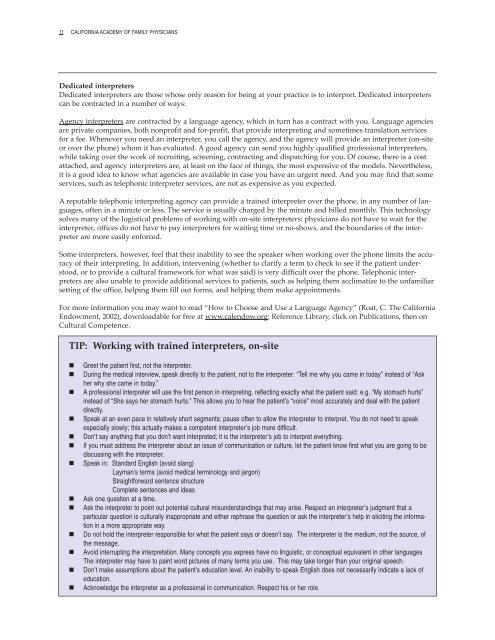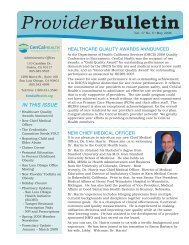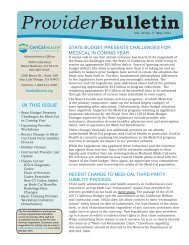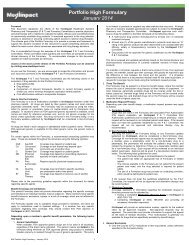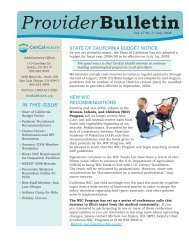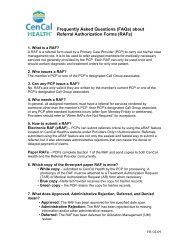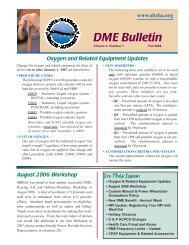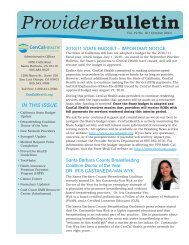Addressing Language Access Issues in Your Practice: A Toolkit for ...
Addressing Language Access Issues in Your Practice: A Toolkit for ...
Addressing Language Access Issues in Your Practice: A Toolkit for ...
Create successful ePaper yourself
Turn your PDF publications into a flip-book with our unique Google optimized e-Paper software.
11 CALIFORNIA ACADEMY OF FAMILY PHYSICIANS<br />
Dedicated <strong>in</strong>terpreters<br />
Dedicated <strong>in</strong>terpreters are those whose only reason <strong>for</strong> be<strong>in</strong>g at your practice is to <strong>in</strong>terpret. Dedicated <strong>in</strong>terpreters<br />
can be contracted <strong>in</strong> a number of ways:<br />
Agency <strong>in</strong>terpreters are contracted by a language agency, which <strong>in</strong> turn has a contract with you. <strong>Language</strong> agencies<br />
are private companies, both nonprofit and <strong>for</strong>-profit, that provide <strong>in</strong>terpret<strong>in</strong>g and sometimes translation services<br />
<strong>for</strong> a fee. Whenever you need an <strong>in</strong>terpreter, you call the agency, and the agency will provide an <strong>in</strong>terpreter (on-site<br />
or over the phone) whom it has evaluated. A good agency can send you highly qualified professional <strong>in</strong>terpreters,<br />
while tak<strong>in</strong>g over the work of recruit<strong>in</strong>g, screen<strong>in</strong>g, contract<strong>in</strong>g and dispatch<strong>in</strong>g <strong>for</strong> you. Of course, there is a cost<br />
attached, and agency <strong>in</strong>terpreters are, at least on the face of th<strong>in</strong>gs, the most expensive of the models. Nevertheless,<br />
it is a good idea to know what agencies are available <strong>in</strong> case you have an urgent need. And you may f<strong>in</strong>d that some<br />
services, such as telephonic <strong>in</strong>terpreter services, are not as expensive as you expected.<br />
A reputable telephonic <strong>in</strong>terpret<strong>in</strong>g agency can provide a tra<strong>in</strong>ed <strong>in</strong>terpreter over the phone, <strong>in</strong> any number of languages,<br />
often <strong>in</strong> a m<strong>in</strong>ute or less. The service is usually charged by the m<strong>in</strong>ute and billed monthly. This technology<br />
solves many of the logistical problems of work<strong>in</strong>g with on-site <strong>in</strong>terpreters: physicians do not have to wait <strong>for</strong> the<br />
<strong>in</strong>terpreter, offices do not have to pay <strong>in</strong>terpreters <strong>for</strong> wait<strong>in</strong>g time or no-shows, and the boundaries of the <strong>in</strong>terpreter<br />
are more easily en<strong>for</strong>ced.<br />
Some <strong>in</strong>terpreters, however, feel that their <strong>in</strong>ability to see the speaker when work<strong>in</strong>g over the phone limits the accuracy<br />
of their <strong>in</strong>terpret<strong>in</strong>g. In addition, <strong>in</strong>terven<strong>in</strong>g (whether to clarify a term to check to see if the patient understood,<br />
or to provide a cultural framework <strong>for</strong> what was said) is very difficult over the phone. Telephonic <strong>in</strong>terpreters<br />
are also unable to provide additional services to patients, such as help<strong>in</strong>g them acclimatize to the unfamiliar<br />
sett<strong>in</strong>g of the office, help<strong>in</strong>g them fill out <strong>for</strong>ms, and help<strong>in</strong>g them make appo<strong>in</strong>tments.<br />
For more <strong>in</strong><strong>for</strong>mation you may want to read “How to Choose and Use a <strong>Language</strong> Agency” (Roat, C. The Cali<strong>for</strong>nia<br />
Endowment, 2002), downloadable <strong>for</strong> free at www.calendow.org; Reference Library, click on Publications, then on<br />
Cultural Competence.<br />
TIP: Work<strong>in</strong>g with tra<strong>in</strong>ed <strong>in</strong>terpreters, on-site<br />
• Greet the patient first, not the <strong>in</strong>terpreter.<br />
• Dur<strong>in</strong>g the medical <strong>in</strong>terview, speak directly to the patient, not to the <strong>in</strong>terpreter: “Tell me why you came <strong>in</strong> today” <strong>in</strong>stead of “Ask<br />
her why she came <strong>in</strong> today.”<br />
• A professional <strong>in</strong>terpreter will use the first person <strong>in</strong> <strong>in</strong>terpret<strong>in</strong>g, reflect<strong>in</strong>g exactly what the patient said: e.g. “My stomach hurts”<br />
<strong>in</strong>stead of “She says her stomach hurts.” This allows you to hear the patient’s “voice” most accurately and deal with the patient<br />
directly.<br />
• Speak at an even pace <strong>in</strong> relatively short segments; pause often to allow the <strong>in</strong>terpreter to <strong>in</strong>terpret. You do not need to speak<br />
especially slowly; this actually makes a competent <strong>in</strong>terpreter’s job more difficult.<br />
• Don’t say anyth<strong>in</strong>g that you don’t want <strong>in</strong>terpreted; it is the <strong>in</strong>terpreter’s job to <strong>in</strong>terpret everyth<strong>in</strong>g.<br />
• If you must address the <strong>in</strong>terpreter about an issue of communication or culture, let the patient know first what you are go<strong>in</strong>g to be<br />
discuss<strong>in</strong>g with the <strong>in</strong>terpreter.<br />
• Speak <strong>in</strong>: Standard English (avoid slang)<br />
Layman’s terms (avoid medical term<strong>in</strong>ology and jargon)<br />
Straight<strong>for</strong>ward sentence structure<br />
Complete sentences and ideas<br />
• Ask one question at a time.<br />
• Ask the <strong>in</strong>terpreter to po<strong>in</strong>t out potential cultural misunderstand<strong>in</strong>gs that may arise. Respect an <strong>in</strong>terpreter’s judgment that a<br />
particular question is culturally <strong>in</strong>appropriate and either rephrase the question or ask the <strong>in</strong>terpreter’s help <strong>in</strong> elicit<strong>in</strong>g the <strong>in</strong><strong>for</strong>mation<br />
<strong>in</strong> a more appropriate way.<br />
• Do not hold the <strong>in</strong>terpreter responsible <strong>for</strong> what the patient says or doesn’t say. The <strong>in</strong>terpreter is the medium, not the source, of<br />
the message.<br />
• Avoid <strong>in</strong>terrupt<strong>in</strong>g the <strong>in</strong>terpretation. Many concepts you express have no l<strong>in</strong>guistic, or conceptual equivalent <strong>in</strong> other languages<br />
The <strong>in</strong>terpreter may have to pa<strong>in</strong>t word pictures of many terms you use. This may take longer than your orig<strong>in</strong>al speech.<br />
• Don’t make assumptions about the patient’s education level. An <strong>in</strong>ability to speak English does not necessarily <strong>in</strong>dicate a lack of<br />
education.<br />
• Acknowledge the <strong>in</strong>terpreter as a professional <strong>in</strong> communication. Respect his or her role.


